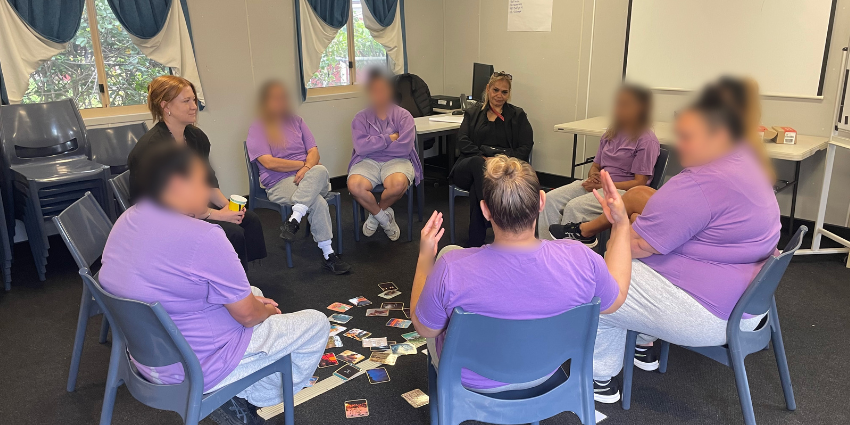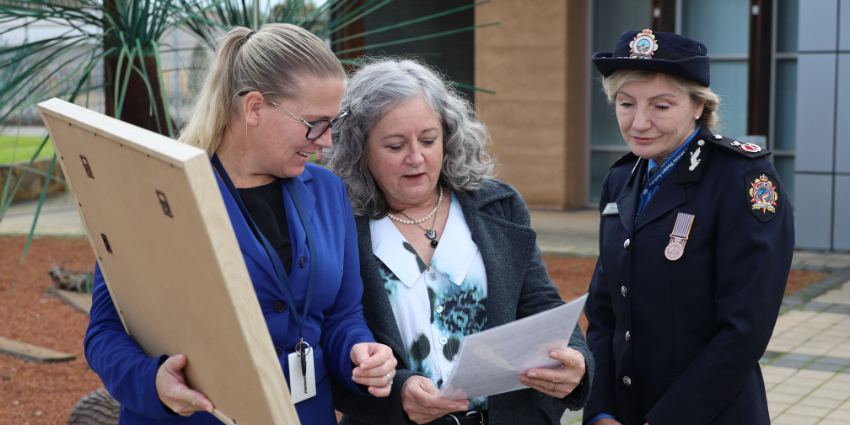Family Domestic Violence program gives women prisoners fresh hope.
The group of women prisoners are casually sharing yarns, speaking confidently and even laughing out loud at an off-colour joke.
There's a lot of love in the Bandyup demountable between the women and with program facilitators Kat and Gaylene. A passer-by wouldn't likely twig that the participants are all victim-survivors of family and domestic violence.
It was a vastly different mood when these graduates of the Leave Safe Stay Safe program arrived for their first session 10 weeks earlier.
"We see a lot of change in the girls from when they first come in to when they graduate, the change in their body language," Gaylene said.
Participating prisoners said joining the group was tense and confronting at first. "My emotions were very, very heightened and very unstable," one said. "I had no knowledge whatsoever of these things I was feeling while I was feeling them."
Another participant said: "At the beginning of the group, I had anxiety. I had anger problems. It just triggered me."
Designed to educate, protect and support women with a history of FDV before and after release, the Australia-first pilot program has been an unqualified success since its launch two years ago.
More than 130 women have taken part in Leave Safe Stay Safe at Bandyup and Greenough Regional Prison.
"The interest in the program has been huge. We started out running two groups a year. We're now doing four," Sarah Patterson, chief executive of service provider Redgum Justice, said. "It is purely voluntary. But there is a lot more demand than we can supply."
The Department co-designed Leave Safe Stay Safe with the community sector and it is managed by the Office of the Commissioner for Victims of Crime in collaboration with Corrective Services.
Redgum Justice staff facilitate the sessions at Bandyup and Regional Alliance West conducts the program at Greenough.
"The girls have been designing and adapting the program with each group of women that's come through so that it's tailored for what they need," Sarah said. "We started with what we thought they needed, and now it's what they actually need."
Participants are given one-on-one social support and legal advice to help them make better choices when returning to the community. That includes help with the Family Court, child custody arrangements and applying for family violence restraining orders.
The Leave Safe Stay Safe team to date has provided case management, including legal services, for 75 women from Bandyup and 17 from Greenough.
They women also participate in counselling, risk assessment and safety planning before and after release. They learn about online safety from women's services network WESNET and upon release receive a 'clean' smartphone preloaded with important information and contacts.
"I think the number one thing that I've taken from it is just that lack of knowledge from the women about what is family violence and how they really underestimated how much family violence they've been exposed to across their whole life," Commissioner for Victims of Crime Kati Kraszlan said.
"In WA, 85 to 90 per cent of women who are in prison are victims of family violence, sexual violence or child abuse," Kati said. "So this program is really about addressing why they're offenders through looking at the issues that are victim-focused."
Acting Deputy Commissioner for Adult Women's Prisons Anika Smith said the primary offences of women prisoners were drugs and alcohol and then property theft.
"A lot of that relates to the helplessness that they feel being subjected to violent situations, having to try and provide care and food for their children, find homes and, on top of that, often they don't have control over their finances," Anika said.
She said one benefit of the program was a reduction in violent behaviour among the prisoners who take part. "A lot of the women choose different ways of dealing with their emotions. They become more settled, more focused on how they interact with other people."
Another unexpected outcome has been women getting their children back in their lives. "Through the family lawyers that we have at Redgum Justice, they've been able to provide legal advice, which has resulted in mothers reconnecting with their children, which is a key part of recovering from family and domestic violence," Kat said.
Like at the beginning, tears were shed when the course ended for this group, but for different reasons.
"I cried the day of graduation," one participant said. "Because of what I got from the program. It's changed my life for the better. I'm a different person now."
Her classmate said: "All of us were all so proud of each other. Like, we walk around in the units telling everybody, 'all you need to do this Leave Safe Stay Safe'."
Both of the women interviewed said with certainty that doing the program had helped ensure they would not re-offend after release.
"My biggest hope is the women leave prison, that they're safe from violence, they are able to have their children, and then they can move into accommodation and employment, and that we don't see them back as offenders," Kati said.








